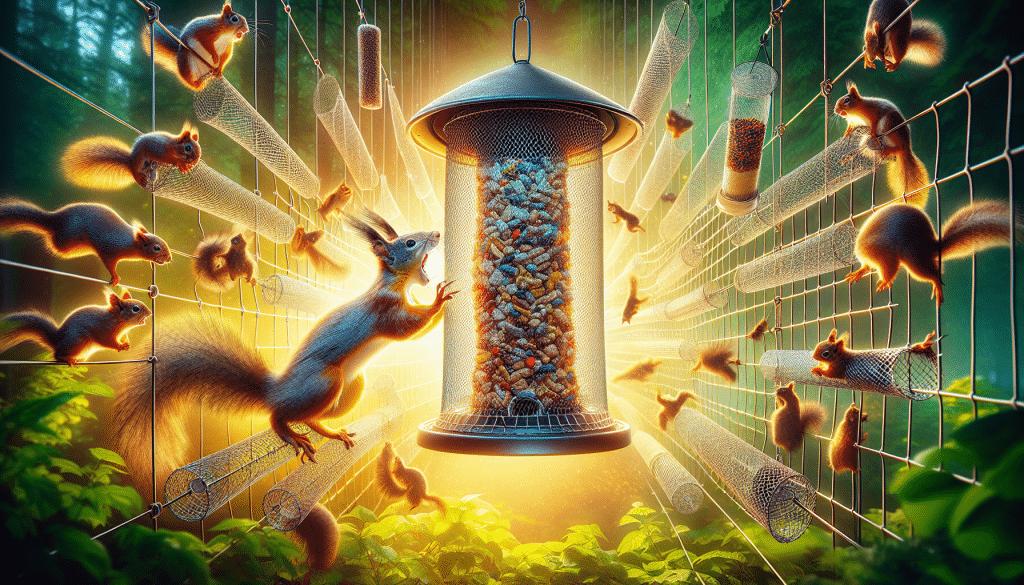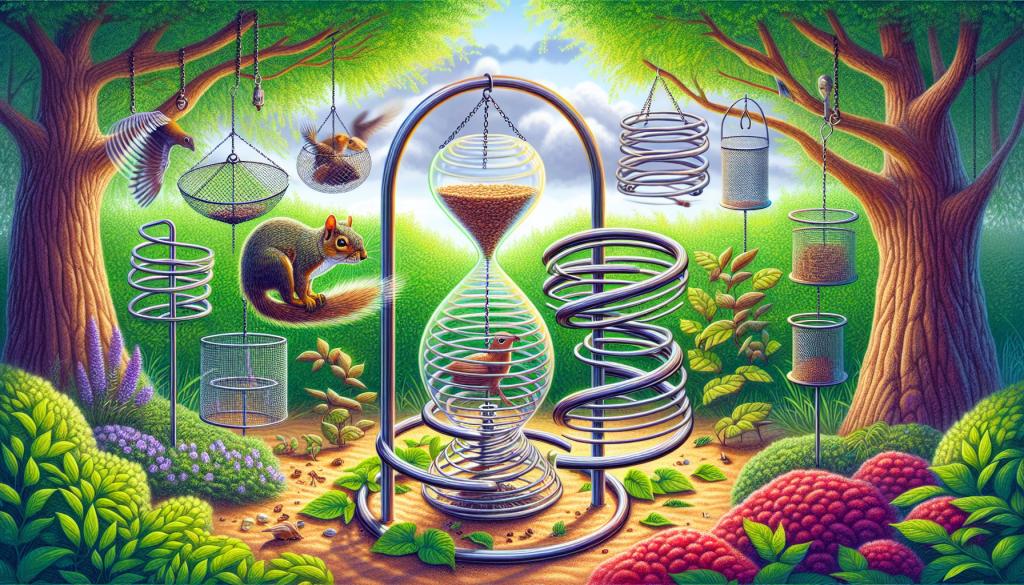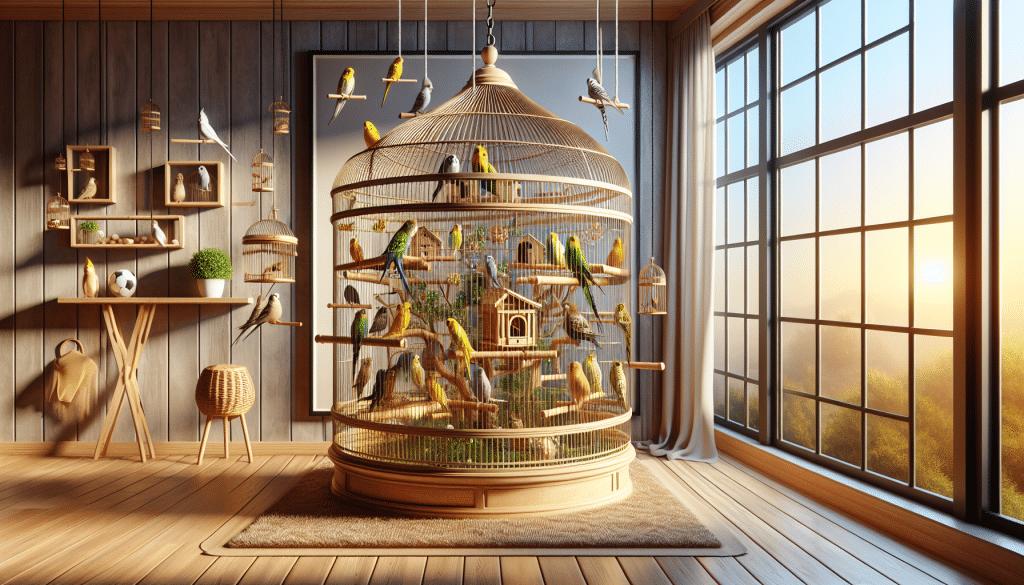Are you tired of squirrels invading your bird feeder and eating all the seeds meant for the birds? Well, we have some great news for you! In this article, we will show you some simple and effective ways to keep those pesky squirrels away from your bird feeders. No more worrying about empty bird feeders or squirrels stealing all the food. So get ready to learn how to protect your bird feeders and attract more beautiful birds to your backyard!

Understanding Squirrels’ Behavior
Squirrels are fascinating creatures that we often see scampering about in our yards or climbing trees. But have you ever wondered why they do what they do? Let’s take a look at some interesting facts about squirrels’ behavior.
Squirrels’ Eating Habits
Squirrels are omnivores, which means they eat both plants and animals. They have a diverse diet that includes nuts, seeds, fruits, insects, eggs, and even small birds. They are known for their incredible ability to store food for later. Squirrels dig holes in the ground and bury their food to eat during the winter months when food is scarce. So if you see a squirrel digging in your yard, it’s probably looking for a place to store its snacks!
How Squirrels Climb
Squirrels are excellent climbers, and they can scale trees and other structures with ease. Have you ever noticed how they can run up a tree trunk without falling? Well, it’s because they have sharp claws that allow them to grip onto the bark. They also have powerful hind legs that help them leap from branch to branch. So next time you see a squirrel effortlessly climbing a tree, remember that it’s all thanks to their amazing adaptations!
The Time of Day Squirrels Are Most Active
Have you ever wondered when squirrels are most active? Squirrels are diurnal animals, which means they are primarily active during the day. If you pay close attention, you may notice that they are most active in the early morning and late afternoon. During these times, they are busy foraging for food and preparing for the winter ahead. So if you want to catch a glimpse of these furry creatures in action, make sure to keep an eye out during these periods!
The Role of Feeder Placement in Deterring Squirrels
Bird feeders are a great way to attract beautiful birds to your yard, but sometimes squirrels can be a bit too enthusiastic about the free food. So how can you keep squirrels away from your bird feeders? One effective method is placing the feeders strategically.
Importance of Distance from Trees or Posts
When it comes to feeder placement, it’s important to consider the distance from trees or posts. Squirrels are incredibly agile and can jump significant distances. If your feeder is too close to a tree or post, these acrobatic creatures can easily leap onto it. To prevent this, try placing your feeder at least 10 feet away from any structure that a squirrel could use as a launching pad.
Recommended Height for Bird Feeders
Another factor to consider is the height of your bird feeder. Squirrels are skilled climbers, so placing the feeder too low could make it easy for them to reach. To deter squirrels, it is recommended to hang the feeder at least 5 feet off the ground. This height makes it more challenging for them to access the feeder and helps protect the food for the birds.
Impact of Feeder Location on Squirrel Access
In addition to the distance and height, the general location of your bird feeder can also affect squirrel access. If you have a lot of trees or bushes near the feeder, it can provide squirrels with easy access points. Try to place your feeder in an open area, away from any overhanging branches or dense shrubbery. This will make it more difficult for squirrels to reach the feeder and discourage them from trying.

Use of Squirrel Baffles
Squirrel baffles are another useful tool for deterring squirrels from bird feeders. But what exactly are squirrel baffles, and how do they help?
What Are Squirrel Baffles?
Squirrel baffles are specially designed devices that can be placed on bird feeders or feeding poles to prevent squirrels from climbing or accessing the food. They are typically dome-shaped or cylindrical and made from materials like metal or plastic. The baffle’s smooth surface makes it nearly impossible for squirrels to grip and climb over.
Benefits of Using Squirrel Baffles
Using squirrel baffles can have several benefits. Firstly, they are highly effective at keeping squirrels away from the bird feeders. The slippery surface and domed shape make it challenging for squirrels to maneuver around or over the baffle. Secondly, squirrel baffles are durable and weather-resistant, so they can withstand outdoor conditions for a long time. Lastly, squirrel baffles are easy to install and require minimal maintenance, making them a convenient option for keeping pesky squirrels at bay.
Installation Tips for Squirrel Baffles
When installing a squirrel baffle, it’s essential to follow a few guidelines to ensure its effectiveness. Firstly, make sure the baffle is large enough to cover the entire feeder pole or hang beneath the feeder. This prevents squirrels from reaching the feeder from any angle. Secondly, the baffle should be placed at least 4-5 feet above the ground to ensure that squirrels cannot jump or climb onto it. Finally, check the baffle regularly to ensure it’s securely attached and hasn’t been damaged by weather or wildlife.
Choosing Squirrel-Proof Bird Feeders
If squirrel baffles alone aren’t enough to keep pesky squirrels away, you may need to invest in squirrel-proof bird feeders. These feeders are specifically designed to deter squirrels and protect the bird food. But what features should you look for when choosing a squirrel-proof bird feeder?
Features of Squirrel-Proof Bird Feeders
Squirrel-proof bird feeders are equipped with various features that make them less accessible to squirrels. Look for feeders with sturdy construction, preferably made from metal or chew-resistant materials. Opt for feeders with adjustable perches that close or collapse under the weight of a squirrel, preventing them from accessing the food. Some squirrel-proof feeders even have built-in mechanisms that spin or tilt when a squirrel tries to hang onto them, making it nearly impossible for them to reach the bird food.
Different Types of Squirrel-Proof Feeders
There are several types of squirrel-proof bird feeders available, each with its unique design and mechanism. The most common types include tube feeders with weight-activated perches, caged feeders with smaller openings to allow access to birds but not squirrels, and wooden feeders with metal or plastic baffles to deter squirrels from climbing. The choice ultimately depends on your preferences and the specific squirrel challenges you face in your area.
How to Choose the Best Squirrel-Proof Bird Feeder
When choosing a squirrel-proof bird feeder, consider the size and type of birds you want to attract. Some feeders are better suited for smaller birds, while others accommodate larger species. It’s also helpful to read reviews or ask for recommendations to find a feeder that has a proven track record of effectively deterring squirrels. Additionally, consider the ease of cleaning and refilling the feeder, as regular maintenance is crucial for the health of the birds.

Choosing Bird Foods That Are Less Attractive to Squirrels
To further discourage squirrels from invading your bird feeders, you can make strategic choices when it comes to the type of bird food you offer. Some foods are less appealing to squirrels, making them more likely to leave the feeders alone.
Examples of Bird Food That Squirrels Dislike
Squirrels have specific preferences when it comes to food, and there are certain options that they find less enticing. For instance, safflower seeds are generally unappealing to squirrels but are loved by many bird species like cardinals and chickadees. Nyjer thistle seeds are also an excellent choice as squirrels have a harder time accessing them due to their small size. Mixing in hot peppers or chili flakes with the birdseed can also be an effective deterrent, as squirrels dislike the spicy taste.
Importance of Food Choice in Deterring Squirrels
Choosing the right bird food can play a significant role in deterring squirrels from bird feeders. When squirrels realize that the offered food is not their favorite, they are more likely to search for alternative food sources. By providing bird food that squirrels don’t enjoy as much, you are encouraging them to look for food elsewhere, reducing their interference with bird feeders.
How to Evaluate the Effectiveness of Food Choice
To evaluate the effectiveness of the chosen bird food, observe the behavior of squirrels around the feeders. If you notice that squirrels are less interested in the feeder or spend less time attempting to access the food, it’s a good indication that the food choice is working. However, keep in mind that it may take some time for squirrels to discover their dislike for certain foods, so be patient and monitor their behavior over a period of time.
Use of Hot Spices in Bird Food
Did you know that you can use spices to deter squirrels from bird feeders? Squirrels have a sensitive palate, and certain hot spices can be an effective deterrent.
How Hot Spices Deter Squirrels
Squirrels have a keen sense of taste, and they are not fond of spicy flavors. By mixing hot spices, such as cayenne pepper or chili flakes, into the bird food, you create a taste that squirrels find unpleasant. When squirrels encounter the spicy food, they are less likely to continue eating it, reducing their interest in the bird feeders.
Birds’ Reaction to Hot Spices
While squirrels may dislike the taste of hot spices, birds are not affected by them. Birds have a different taste receptor structure that makes them immune to the spicy sensation. This means that using hot spices in bird food will not deter birds from visiting the feeders. It’s a win-win situation – birds can enjoy their meal in peace, while squirrels are deterred from stealing their food.
How to Properly Mix Hot Spices in Bird Feed
When using hot spices in bird food, it’s essential to mix them thoroughly and evenly. Start by adding a small amount of the chosen spice to the birdseed and mix it well. Gradually increase the amount of spice until you find a level that deters squirrels but doesn’t overpower the birds. It’s best to experiment with different amounts until you achieve the desired effect. Remember to wear gloves when handling hot spices, as they can irritate your skin or eyes.
Creating a Dedicated Feeding Area for Squirrels
Squirrels are resourceful and persistent animals, and sometimes it’s best to provide them with their own dedicated feeding area. This can help redirect their attention from the bird feeders and ensure everyone gets a fair share of food.
Benefits of a Dedicated Squirrel Feeding Area
Creating a dedicated feeding area for squirrels has several benefits. Firstly, it helps minimize their interference with bird feeders by providing them with an alternative food source. Secondly, it allows you to control the types and amounts of food provided, preventing squirrels from getting too comfortable or relying solely on the bird feeders. Lastly, it can be a great opportunity for observation and enjoyment as you witness the playful antics of squirrels up close.
Types of Food to Provide in a Squirrel Feeding Area
When setting up a squirrel feeding area, it’s important to offer foods that squirrels enjoy. Provide a variety of nuts, seeds, and fruits that are safe for squirrels to consume. Peanuts, walnuts, sunflower seeds, and sliced apples are all popular choices. You can also include squirrel feed blocks or corn cobs, which are specially formulated diets for squirrels. Make sure to place the food in a secure and easily accessible location, away from predators or potential dangers.
Examples of Squirrel Feeding Area Setups
There are various ways you can set up a squirrel feeding area, depending on the space and resources available. One option is to place a dedicated squirrel feeder on a tree or hang it from a branch. Another option is to create a squirrel picnic area by scattering food on a designated spot in your yard. You can also use a squirrel feeder station with multiple feeders to provide different food options. Ultimately, the goal is to create an inviting and safe space for squirrels to enjoy their meals.
Use of Commercial Repellents for Squirrels
If you’ve tried other methods but still can’t keep squirrels away from your bird feeders, you may consider using commercial repellents. These products are specifically designed to deter squirrels and protect your bird feeders.
Overview of Squirrel Repellents
Squirrel repellents come in various forms, including sprays, granules, and electronic devices. They often contain natural or chemical ingredients that produce smells or tastes that squirrels find unpleasant. Repellents work by creating a barrier or deterrent effect around the bird feeders, discouraging squirrels from approaching or accessing the food.
How to Apply Squirrel Repellents
Before applying any squirrel repellent, carefully read and follow the instructions provided by the manufacturer. Some repellents may require dilution or mixing with water, while others may come in ready-to-use forms. Apply the repellent according to the product instructions, focusing on the areas surrounding the bird feeders or any access points that squirrels may use. Reapply the repellent as needed, especially after rainfall or if you notice increased squirrel activity.
Evaluating the Effectiveness of Squirrel Repellents
The effectiveness of squirrel repellents can vary depending on several factors, including the specific product used, environmental conditions, and the persistence of the squirrels in your area. Monitor the behavior of squirrels around the bird feeders after applying the repellent. If you notice a significant decrease in squirrel activity or fewer attempts to access the feeders, it can be an indication that the repellent is working. Keep in mind that repellents may need to be used in conjunction with other deterrent methods for optimal results.
Employing Electronic Devices as Deterrents
If you’re dealing with particularly persistent squirrels, you may need to consider using electronic devices as deterrents. These devices emit sounds or vibrations that are unpleasant to squirrels, helping to keep them away from the bird feeders.
Types of Electronic Devices That Deter Squirrels
Electronic squirrel deterrents come in different forms, including ultrasonic devices and vibrating platforms. Ultrasonic devices emit high-frequency sounds that are inaudible to humans but disrupting to squirrels. Vibrating platforms are placed under bird feeders and produce vibrations that squirrels find uncomfortable. Both types of devices aim to create an unwelcome environment for squirrels without causing harm.
How to Install Electronic Deterrents
When installing electronic squirrel deterrents, carefully follow the manufacturer’s instructions. Ultrasonic devices are typically hung near the bird feeders or strategically placed in the vicinity. Vibrating platforms are positioned under the feeders, ensuring they are secure and stable. Pay attention to the recommended distance and coverage area specified by the device manufacturer. Regularly check the batteries or power supply to ensure the devices are functioning correctly.
Assessing the Effectiveness of Electronic Squirrel Deterrents
The effectiveness of electronic squirrel deterrents can vary depending on factors such as the sensitivity of the squirrels in your area and the quality of the devices used. Monitor the behavior of squirrels after installation and observe whether there is a decrease in their attempts to access the bird feeders. It may take some time for squirrels to associate the unpleasant sensations with the feeders, so be patient and give the deterrents a chance to work. Consider using electronic deterrents in combination with other methods for the best results.
Consulting with Wildlife Control Professionals
If all else fails, or if you find yourself dealing with a severe squirrel infestation, it may be time to seek help from wildlife control professionals. These experts have the knowledge and experience to assist you in deterring squirrels effectively.
When to Consider Professional Intervention
Professional intervention is recommended when you’ve exhausted all other methods, but squirrels continue to cause problems or pose a threat. Signs that it’s time to call a wildlife control professional include severe damage to property, repeated unsuccessful attempts to deter squirrels, or concerns about safety or health risks associated with a large squirrel population. Professionals can assess the situation, provide expert advice, and offer effective solutions tailored to your specific needs.
How Professionals Can Help Deter Squirrels
Wildlife control professionals have access to a range of tools and techniques to deter squirrels and resolve infestations. They can conduct a thorough assessment of your property, identify potential entry points or nesting areas, and implement effective exclusion methods to prevent squirrels from accessing your home or bird feeders. Additionally, professionals can provide guidance on long-term prevention strategies and offer valuable insights into squirrel behavior and habits.
Finding Reputable Wildlife Control Professionals
When looking for wildlife control professionals, it’s important to find reputable and licensed professionals in your area. Start by asking for recommendations from friends, neighbors, or local wildlife organizations. Research the credentials and accreditation of the professionals you are considering, and ensure they have experience with squirrel control. Review customer testimonials or online reviews to gauge their reputation and reliability. By choosing an experienced and reputable professional, you can have peace of mind knowing that your squirrel problems are in capable hands.
In conclusion, understanding squirrels’ behavior is the first step in effectively deterring them from bird feeders. By employing strategies such as feeder placement, squirrel baffles, squirrel-proof bird feeders, food choice, hot spices, dedicated feeding areas, repellents, electronic devices, or professional help, you can create a harmonious environment for both birds and squirrels. Remember, it’s all about finding a balance that allows everyone to enjoy the wonders of nature in your backyard.



